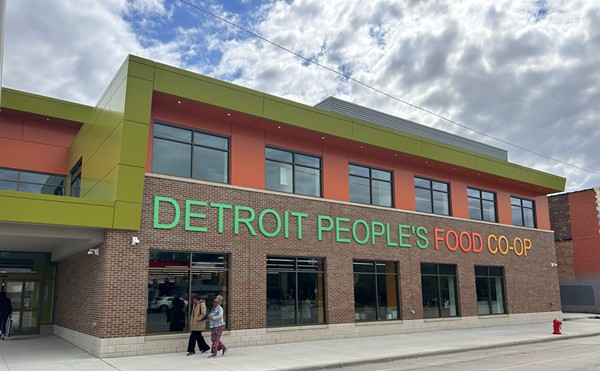As a new member of the Riverwood Community Church in Sterling Heights 19 months ago, Karen Liedigk attended women's Sunday school classes and Thursday night Bible study. She went to regular services and was in the Christmas play.
"Everything was fine. I was well-accepted in the church," she explains.
But about six months into her membership, she says, Pastor Roger Reibling called her to a meeting with some elders. He had a copy of an article written about a talk she gave at Wayne State University in November 2006.
"He said, 'What's this? You're transgendered? You're an activist? What's going on here?'" she recalls.
"I said, 'Look, everybody is not born the same. I was born transgendered. As for me being an activist, I do try to help other people in the same situation that I'm in,'" she told him. "I said, 'We share the same God.' He said, 'I don't think so.'"
Karen Liedigk was born "Kurt" 69 years ago. Married at 21, he served in the U.S. Navy, including a tour in Vietnam, before returning to suburban Detroit to raise children, work as a materials manager and, eventually, seek psychological treatment for what was diagnosed by a psychologist as transsexualism: born as one sex but identifying and seeking to live as the other.
"It's a very strange condition. It's virtually psychologically unshiftable," says Neil Wilson, a plastic surgeon at Henry Ford Hospital who performs reassignment surgeries. "It's not a choice, it's a drive."
Liedigk had sex-change surgery at the University of Michigan in 1997. Kurt became Karen, her birth certificate and high school diploma were changed. She has softly styled reddish brown hair, manicured nails and bright green eyes behind her feminine eyeglass frames.
While her appearance and sex changed, her Christian beliefs and desire to be part of a church did not. "I've been a Christian my whole life," she says.
She first attended a predominantly gay-lesbian church but, as a transgendered person, she didn't share the same concerns as others in the congregation. She found a church closer to her Clinton Township home: Riverwood Community Church, part of the Christian and Missionary Alliance, an evangelical Protestant denomination.
She liked the people. She liked the services. She liked the Bible study and other activities and found it a friendly place.
After all, Riverwood's Web site states, "Our desire is to provide sound biblical teaching, meaningful worship, and a warm and loving fellowship in a place where you can be yourself."
As long as that self is straight and, oh, conventionally male or female, she found out. Which, now that we think about it, might be where the phrase "damn straight" actually comes from.
That first meeting Liedigk had with the pastor turned into a series of written communications. He sent her the church's "Statement on Transgenders" in July 2007 that read: "A transgender lifestyle is one evidence of the universal human rejection of God's supreme glory and like all forms of behavior that violate God's original design — it is sin."
Liedigk replied with descriptions of the physiological, neurological and genetic factors that cause transsexualism when the brain develops as one gender while the body is the opposite sex.
"I can find no reference in the Bible that being transgendered/intersex is a sin and that I cannot be accepted into God's church," Liedigk wrote.
Eventually, Reibling sent her a letter dated April 13 stating she should not attend Riverwood nor "come onto our property.
The letter, which Liedigk gave to News Hits, reads, in part: "Our desire through these past months was that God would use us and His Word to spiritually redeem you and restore you to Himself and to His church."
News Hits tried to ask Pastor Reibling what exactly that meant, but he didn't return telephone calls or e-mail messages.
So we asked Dr. Wilson: Can the power of prayer undo a person's lifelong knowledge they should have been the opposite sex? Does the word of God trump the science that shows in utero hormonal factors that contribute to transgenderism and transsexualism? Can the church undo what biology and medicine have done?
"I had one female-to-male patient cut off the dick we built her," Wilson says. "But I don't think you can make a point anywhere, anyhow, anytime that you're a quote-unquote 'sinner' if you decide to follow what you feel to make yourself reasonably happy."
Amen for acceptance, was the sentiment of Harry Knox, director of the religion and faith program at the Human Rights Campaign, a national GLBT civil rights organization based in Washington, D.C. He recommends Liedigk find a new church. "That one sounds like it's a psychologically dangerous place for her to be," he says.
And, he says, Riverwood is not reflective of what's happening nationally.
"There's a growing movement and a large number of churches around the country that are affirming of lesbian, gay, bisexual and transgendered people," he says.
The National Gay and Lesbian Task Force keeps a list online at welcomingresources.org and more are added all the time. It's searchable by state.
"The good news is that because transgendered people are telling their own stories, as Karen is, it's really calling the questions for local congregations and pastors," Knox says. "In this case it turned out to be painful, but in many other instances around the country, people accept the transgendered person as a gift from God to their congregation."
And bless them for that.
News Hits is edited by Curt Guyette. Contact him at 313-202-8004 or [email protected]




